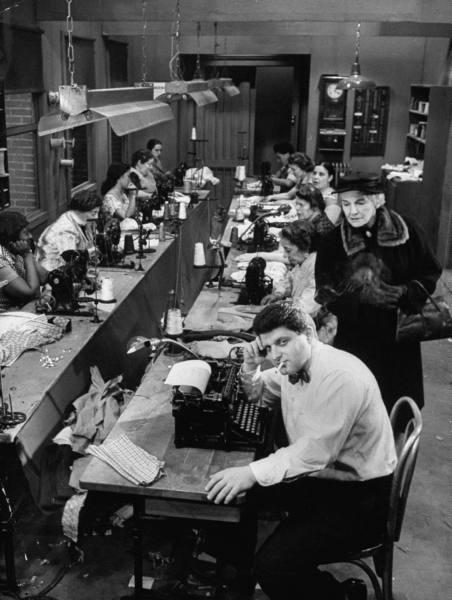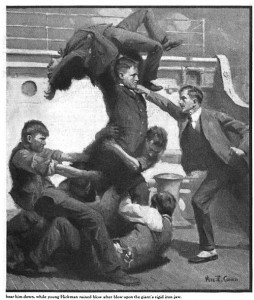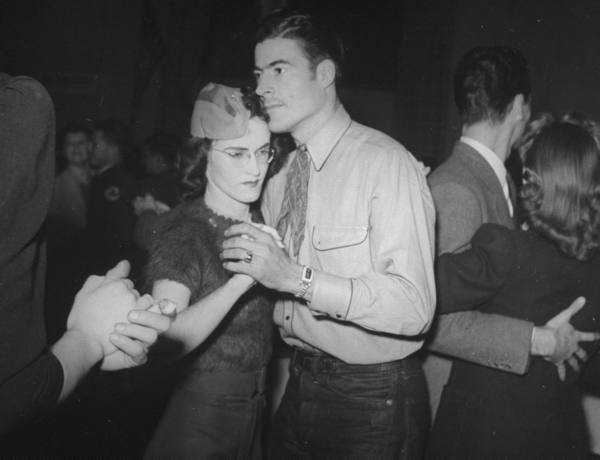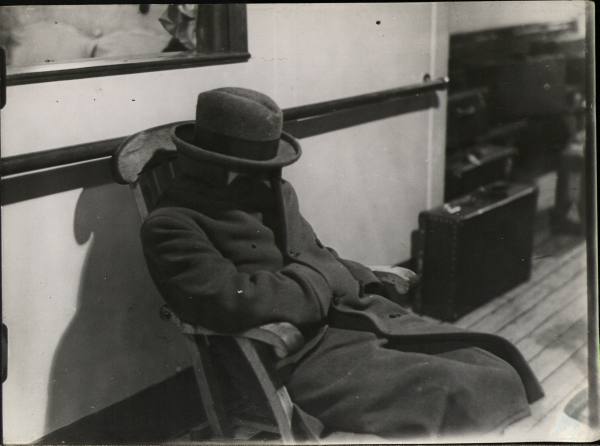 Note: I know this is well overdue, but I’ve been ruminating about this article and the writer’s plight for some time since reading it. Basically, here’s why it’s okay for writers (and other artists) to think the world owes them a living when we provide services. Expecting otherwise is downright un-American.
Note: I know this is well overdue, but I’ve been ruminating about this article and the writer’s plight for some time since reading it. Basically, here’s why it’s okay for writers (and other artists) to think the world owes them a living when we provide services. Expecting otherwise is downright un-American.
When you’re younger and say you want to be a writer, people look at you as if you’ve decided to breed flying velvet unicorns for a living. Parents, teachers, and minimum wage employers are the most common criers of boo. The nastier ones tell you to forget about it because you’ll die poor, hungry, and alone. The limply supportive ones beg you to find a “career” and do a little writing on the side—you know, to be safe. Just remember: it’s not a real job. More on that later.
But you keep it up, and eventually someone might decide your words are worth paying for. Not a lot. Nothing close to compensating you for your time, research, expenses, etc. The most I ever got was about $1,200 for an feature article. Awesome, right? I must be wearing mink underwear under an ermine jumpsuit, right? Well, after calculating the aforementioned, time, research, expenses, etc., and including the endless rewrites insisted upon by the editor (who, according to his suggestions, appeared to be reading a different article) I should have cleared way more (and let’s not get into taxes, healthcare, social security, etc.—you have to mail the government their chunk on your own). But you make sacrifices, because thank goodness you’re being published, and you understand the publishing industry is always in a rough way. You take what you can get.
And then you grow older. You acquire a spouse, perhaps, a home, children, and so forth. You take on writing jobs you’d rather not do or get a day job you don’t hate (if you’re lucky), to keep food on the table. Society continues to be no help at all. Even as it consumes writing in the form of books, newspapers, the Internet, films, TV shows, and so on, it still views you as an aberration. On the face of it, you produce nothing of value. You can’t eat an essay; you can’t build condos on a novel. And after all, writing isn’t WORK! Writing is “fun.” Bricklaying, plumbing, accounting, selling, marketing, lawyering, and so on—by gum, those are REAL jobs that deserve to be given a living wage, because they
contribute. And they’re boring—unless you’re lucky enough to have a penchant for cement, figures, and torts.
The arts and artists, on the other hand, deserve to suffer, because what do the arts ever PRODUCE that can be bought and sold?
You know, besides books, newspapers, the Internet, films, TV shows, video games, advertising, and so on.
Anyway, it’s good to suffer for your art! Oddly, society feels it’s not good to suffer for your selling, marketing, or number-crunching. Let me repeat a phrase I coined in a moment of inspiration: Have you ever heard of a “starving young accountant?”
Consider this (and I’m not picking on any particular professions; merely pointing out the facts): even a mediocre to middling lawyer, accountant, or salesperson can earn a living wage. I’m not saying it’s easy or that they work any less hard than a writer, but the system is geared to compensate them for showing up, mucking in, and not messing up—as it should.
Conversely, writing success is rarely equitable to just compensation, according to hours worked and income generated. In the aforementioned fields of publishing, TV, and film, success is parsed out to a lucky, talented, formulaic, shrewd, and/or whorish few. You’ll notice a recurrence of certain names in your favorite media and fan sites. No matter how enjoyable or abysmal their output. They are the few who presumably worked hard, got a break, found an angle, established themselves as dream- and taste-makers, and got paid well for it besides.
Most writers… Well, that never happens for us.
As a full-time writer, you end up in one of four situations: (1) ruling your own personal Stephen Kingdom and making money hand over multiple fists (extremely rare) or making enough doing what you love to afford a comfy home, regular meals, and two dentist visits a year (just plain rare); (2) working a day job (more common); (3) having an EXTREMELY understanding spouse who carries the burden of bringing in a regular paycheck (infrequent but not unheard of); or (4) taking every job that slips over the transom while living on microwaved burritos (too often).
I’m not singing the socialist blues here. It’s a fact of life that we live in a capitalist society, and in a capitalist society you work if you want to survive, because hard work is compensated. At least, that’s the way it used to be, more or less.
The business of business is business, not to mention screwing every person, place, and thing on the planet out of one more nickel. Human beings have long been both ladders and obstacles (with their selfish needs for food, water, shelter, and love) to profit. Thus far American labor laws remain powerful enough to ensure (legal) workers aren’t buggered TOO much, and by and large, cheating people and working them to death are still somewhat frowned on. I’m not talking about undocumented workers, obviously, and minimum wage is purely a joke, but my point is that the general rule is that you MUST compensate people somehow for their time and effort, otherwise, they’ll walk away. How then to ensure you squeeze every last drop of sweat from their bodies and minds while you have them under your thumb? If you’re not paying people enough, your first resort is fear. Work, or I’ll fire you. Work, or I’ll dock your pay. Work, or your kids don’t eat. Work, or I’ll make you even MORE miserable. Work! Regardless, the bosses eventually reach a point where they can’t scream and starve efficiency out of their workers. So, what’s next?
Why you make them “partners,” of course. Not business partners with stock options and whatnot, naturally, but, you know, chums!
Enter the implementation of happy-face corporate programs, disingenuous penny-pinching, and the return of the nonsensical notion that one’s work life is equitable to one’s home life. Your time, skills and knowledge aren’t being rented, pal. Your paycheck is secondary to participating in a splendiferous never-ending picnic of joyous labor. Grab a potato sack, champ, and start racing! Uh, but before you do that, can you stay late to prep that PowerPoint for the CEO’s presentation tomorrow? Golly, why do you look so annoyed? Pulling together is what families DO, right? What? You haven’t seen your real family in weeks? I don’t follow you.
This appears to be what’s happening with our beleaguered writer. Publishing is hurting, pal, and the “family” needs you, because we’re all in this together. The offer of “exposure” in lieu of grocery money is just their little way of stepping up and saying thanks.
Editors who pull this crap know better, since they too are doubtless being reamed by requests from on-high to be more “proactive” (e.g., letting support staff go and assuming more duties for less dough). I suppose “exposure” is an attempt to give something back. Personally, I find it less insulting than the several times an editor tried to schmooze work out of me, because hey, bro, your stuff is very… very… “hip,” amiright? Then again, given a choice between being schmoozed and being offered nonmagical beans for my work, I’d choose… neither. Because it’s a scam either way.
People who aren’t writers may not understand why an experienced scribe wouldn’t leap at the chance for “exposure” in a major magazine. Let me put it this way. Ask any CEO you know if he or she would accept a million pin-back buttons bearing their face instead of cash or stock options. Jeepers, ask anybody on any company’s staff anywhere if they would accept a full-page ad plastered with their face in the major metropolitan newspaper of their choice, in lieu of a month’s pay.
Ah. That daylong flush of excitement doesn’t seem so enticing now, does it?
Exposure is a term of relative value. I’d say that if you’re in your early 20s and starting out in the writing racket, and an editor from a top-tier mag offers you a chance to have your work appear on their blog for naught but “exposure”—you ride that pony until it drops dead, chum. Silver platters show up infrequently—so do it and add an impressive tear sheet to your young, emaciated portfolio (just make sure you retain the rights; there’s no shame in requesting a one-time reprint contract). But here’s a sour truth, kid. Unless you set the editors and their readers afire, that’s likely it for you for a very long time. You might end up in some mid-market mags, newspapers, and sites, and you’ll probably poke along if you keep working your ass off, but you’re not displacing anyone at Harper’s or the New Yorker on the basis of one blog post. Still, well done. I wish you every happiness.
Now, let’s imagine you’ve been writing for 20-plus years. Maybe you haven’t cracked the high-profile markets, but you’ve done okay with local papers, a few web sites, and the like. Maybe you’ve got a small-press book or two under your belt. You’re not a hobbyist or an American primitive discovered typing in a bayou shack. You’ve paid your dues. You’ve flown the flying velvet unicorn past your parents’ front window to their delight. You’re a G-D writer for a living.
And then some editor from a magazine—one from whom you might have collected a stack of rejection letters—comes along and asks you to rewrite a piece of yours for them, for free. No, not for free—for “exposure.”
We’re not talking about a charity or nonprofit you’d contribute to out of the goodness of your heart. No, this is a mag claiming to present ads “from energy companies to luxury products to top tech brands.” (And Scientology too, apparently, cough.) As they love to trumpet, they have A-listers writing for them. They seem to be doing okay. Toughing it out maybe, trying to please the owners, but they’re staying put. According to the articles I’ve been scanning, they’re doing fantastic with their digital presence. Digital… Hey, that’s like blogs and stuff, right?
But they just can’t shake loose with a quarter a word for an article. That’s about $300 for a 1200 word piece; I think I averaged about $250 for an article of that size when I wrote for the Chicago Journal. Not much, but something. I didn’t expect the very local newspapers I write for to pay me my weight in gold. But, man, that Atlantic “exposure.” What a plump, juicy plum, right?
Except it’s not an appearance in the actual magazine, it’s a blog post. Unless your piece memes harder than Grumpycat, your “exposure” will involve a few friends sharing your Facebook link to the site. You are literally working for nothing—no money, no promise of further publication, not even placement on the home page. You’d have equally good results posting it to your own blog. They’ll clear X number of bucks through click-throughs, no doubt, but at least your mom, dad, and significant other will be impressed.
Still, I get it. It sounds cool. I’d probably do it myself because I’m one of those writers with a day job, and I consider writing a vocation, not a career (though I wouldn’t say no to a book contract). But I have no illusions. I’ve had similar “breaks” and near-breaks that came to nothing. Let me give you a grandfatherly piece of writing advice, young scribes—do not wait for the single event that will launch you into the big time. Just work hard, enjoy yourself, and promote your work (no one else will). If fame and fortune come, they come. If not, at least you’re doing what you love. That’s only slightly more rewarding than “exposure,” but it’s something.
Still.
This “exposure” thing is noisome. Claims that exposure is a worthy substitute for pay are irrational to the point of insult. Firstly, and as the Wonkette article points out, this amply demonstrates the beleaguered state of modern journalism, and the workload imposed on editors due to cutbacks. The bean-counters determine that if more work were done by fewer people, there is greater potential for profit. That one human is now doing the work of three—often to deleterious effect for all parties; quality DOES slip, you know—however, escapes them. Best to prod that person to challenge themselves and “innovate” and “impact” ways to improve work processes. If they can’t, well, they’re just being difficult. Fire ’em. Better yet, suggest that you’ll fire them. That’ll pour nitro in their gas tank, and you’ll get three to five months of extra work hours out of them. Hey, editor! BOO! Get your writers to work for exposure peanuts.
We can’t feel too bad for the editor mentioned in the piece either, despite Wonkette’s suggestion. She knows damn well prison life is slightly better for trustees. She’s achieved a comfy position and decided to remain in place by exploiting (or attempting to exploit) others. That’s unfair (both to her and the writers she’s soliciting), not to mention lousy business. This attitude has become endemic in the working world. While companies are pulling in profits, they’re still telling the proles, “Golly, we wish we could throw you a bone, but, you know, we’ve got bills to pay. Heck, we’re barely hanging on here. So why not muck in, champ? Spend a little of your own dough? We’re all in this together!” Where it becomes egregious is when the organization plays the austerity card for years.
Note the mushy statements like “unfortunately…can’t pay you for it” and “I understand if that’s not a workable arrangement for you, I just wanted to see if you were interested.” She’s trying to soften the impact of asking him to suffer a little bit so she, and her magazine, can fill a column and sell ad space. Do you know what that’s called? Manipulation. It’s running a long con, involving many marks in this case, I’m guessing. How many other authors were approached this way? How many sighed, added another notch to their belts, and said, “Oh… okay… I guess so…”? The writer’s work, as well as his or status, is likewise denigrated and devalued further. And the attitude spreads: “Why should I pay you when I can get a hundred writers like you for free?”
This perception is becoming prevalent. Publications are no longer viewed as conveyances of information; they’re ad sheets tacked together by articles and photos. Without advertising, say the moneymen, you wouldn’t HAVE your little Mickey Mouse weekly readers! Yet, they forget that without articles, no one would see their damn ads. The fact that video and audio have supplanted print is entirely different discussion, but let me stress this: people read books, newspapers, and magazines not for the ads, but for the articles. The ads are targeted at these people because of the editorial content they peruse and enjoy. But this perception is being slowly obliterated because it allows for greater profit. “Writing and photography is valueless, so let’s cut the budgets and staff to the bone. But…pursue free content by convincing the creators of their “worthlessness.” Nyah-ha-ha.”
Fellow writers, remember: IF THEY ASK YOU FOR CONTENT, THAT MEANS THEY REQUIRE/DESIRE IT. It HAS value.
There’s another level to the above, not discussed in the piece; though this is only my supposition. Requests like these always carry an implied threat, whether intended or not. “If you work for free this time, I’ll remember you fondly. If you don’t, well, I’ll remember you were ‘difficult.’ No other promises though if you say yes. In fact I’ll probably ask you to work pro bono again.”
When you’re trying to make it in any business—especially one as insular as publishing—you don’t want a “difficult” reputation—particularly when you aren’t difficult. That goes for both sides of the equation. Writers will write for you and write well if they are suitably compensated to the point of being able to buy groceries. So, what gives with the shakedown? What stomach-dissolving need are you fulfilling by shaking down a writer? Wait, I have it. Greed.
Let me quote Heath Ledger’s Joker: “If you’re good at something, never do it for free.” Internships are an exception, I suppose. I recall a local journalist making the case for young reporters coming into local and regional papers to do scut work for nothing but experience. The supposition, however, is that because you are young you probably know jack about the business when you’re starting. The danger rests in attempts to let the average age for interns creep into the late 20s. I imagine we’ll have thirtysomething interns before long, paid with a robe, a daily handful of rice, and a begging bowl. Personally, I believe unpaid full-time intern/apprenticeships only work for Victorian cobblers and blacksmiths, and that they’re just another scam to preserve profit. However, if you’re in school and Mom and Dad are providing a roof and filling the fridge, take advantage of working for nothing for a while to build that portfolio and resume.
But if you’re writer already in the business—and an old hand at that—don’t go for “exposure” unless you can afford it. In fact, don’t bite; because you’re setting a precedent for the next thousand or so writers, and perpetuating the contradictory bugaboo we writers have had to fight all our lives: it’s okay to screw writers, because they produce nothing of value.
Strangely, the media continue to display an insatiable appetite for flying velvet unicorn meat.





